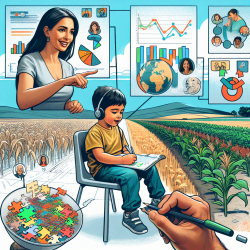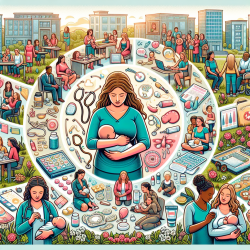Introduction
In the realm of speech-language pathology, particularly in online therapy services like those provided by TinyEYE, the integration of research findings into practice is crucial for enhancing therapeutic outcomes. The research article "Crop Residue Burning in India: Policy Challenges and Potential Solutions" provides insights not only relevant to environmental policy but also offers a framework for understanding how systemic challenges can be addressed through data-driven solutions and stakeholder involvement. This blog will explore how practitioners can leverage these insights to improve their skills and encourage further research.
Understanding the Research
The research by Bhuvaneshwari et al. (2019) highlights the environmental and health impacts of crop residue burning in India, a practice that contributes significantly to air pollution and global warming. The study emphasizes sustainable management practices, such as composting and biochar production, and the importance of government interventions and stakeholder engagement. These insights can be translated into the context of speech-language pathology, where similar challenges of systemic implementation and stakeholder involvement exist.
Applying Research Insights to Online Therapy
Just as the research suggests a multi-faceted approach to crop residue management, speech-language pathologists can adopt a holistic approach to therapy that involves:
- Data-Driven Decision Making: Utilizing evidence-based practices and data analytics to tailor therapy sessions to individual needs, much like how sustainable practices are tailored to specific environmental contexts.
- Stakeholder Engagement: Involving parents, educators, and other professionals in the therapy process to create a supportive network for the child, akin to engaging farmers and policymakers in sustainable practices.
- Continuous Education and Training: Encouraging practitioners to stay informed about the latest research and methodologies, similar to how ongoing education is crucial for implementing new agricultural policies.
Encouraging Further Research
The research underscores the importance of ongoing study and adaptation. For speech-language pathologists, this means actively participating in research initiatives and contributing to the body of knowledge that drives practice improvements. Practitioners are encouraged to explore how interdisciplinary approaches, like those suggested in the study, can be applied to their work.
Conclusion
By drawing parallels between environmental policy challenges and the field of speech-language pathology, practitioners can gain new perspectives on improving therapeutic outcomes. The integration of research insights into practice not only enhances the effectiveness of therapy but also contributes to the broader goal of creating positive outcomes for children.
To read the original research paper, please follow this link: Crop Residue Burning in India: Policy Challenges and Potential Solutions.










